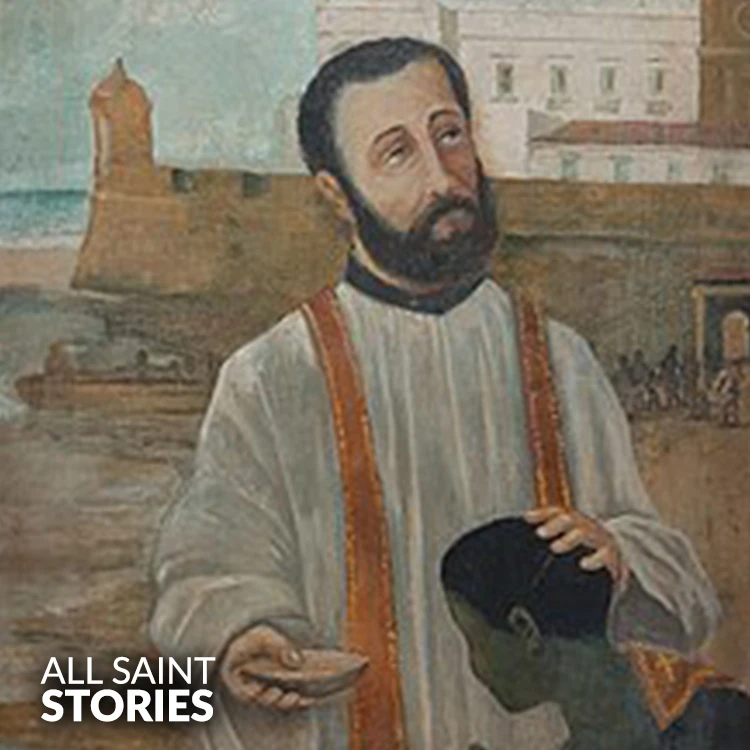Saint Peter Claver, you dedicated your life to serving the poor and oppressed. Through your love and compassion for those in need, you showed us the true meaning of Christian charity. Help us to follow your example of selfless service and to always care for the marginalized in our world. Intercede for us that we may grow in love and faith, and be a source of hope to those who suffer. Amen.
ST. PETER CLAVER
ST. PETER CLAVER

St. Peter Claver was a Spanish Jesuit missionary who dedicated his life to serving African slaves in Colombia. Known as the "Slave of the Slaves," he baptized and ministered to over 300,000 enslaved people, providing them with food, medical care, and spiritual guidance. His tireless efforts for human dignity and justice made him one of the greatest missionaries of his time.
Peter Claver was born on June 26, 1580, in Verdú, a small town in Catalonia, Spain. He entered the Society of Jesus (Jesuits) in 1602 and studied philosophy and theology. While still in formation, Claver felt a strong calling to serve the missions in the New World. In 1610, he arrived in Cartagena, Colombia—a major port in the Spanish Empire known for its central role in the transatlantic slave trade. The conditions there were harrowing: ships regularly arrived packed with enslaved Africans who had endured horrific voyages across the Atlantic Ocean.
Ordained a priest in 1616, Peter Claver committed himself entirely to the care of enslaved people. From the moment ships docked, Claver boarded them to provide food, medicine, and spiritual care, offering comfort and performing baptisms. He did not shy away from the filthy and disease-ridden holds of the slave ships, choosing instead to meet the enslaved in their darkest moments. His tireless efforts earned him the title “Apostle of Cartagena” and, more personally, “the slave of the slaves.”
Peter Claver is believed to have baptized over 300,000 people during his 40 years of ministry. He was deeply committed to the idea that every human being, regardless of their social or legal status, possessed inherent dignity given by God. In a time when the lives of enslaved Africans were often deemed worthless by society, Claver’s work stood as a stark moral contrast. His ministry extended beyond spiritual guidance; he also intervened on behalf of enslaved individuals, advocated for humane treatment, and taught others to care for them with compassion.
Despite frequent illness, opposition, and the overwhelming scale of the human suffering he encountered, Claver never abandoned his mission. He lived simply and humbly, often sleeping on the floor and dedicating all he had to the service of others. In his later years, he suffered from a debilitating illness that left him bedridden. Even then, he continued his ministry through prayer and spiritual advice.
St. Peter Claver died on September 8, 1654. Although he was largely forgotten after his death, his legacy was revived over time, especially in Colombia and among African-descended populations in the Americas. Pope Leo XIII canonized him on January 15, 1888, and later declared him the patron saint of missionaries to African peoples. His example of unconditional love, justice, and humility continues to inspire people today.
Video Not Found
The information on this website is compiled from various trusted sources. While we aim for accuracy, some details may be incomplete or contain discrepancies.
If you notice any errors or have additional information about this saint, please use the form on the left to share your suggestions. Your input helps us improve and maintain reliable content for everyone.
All submissions are reviewed carefully, and your personal details will remain confidential. Thank you for contributing to the accuracy and value of this resource.
Credits & Acknowledgments
- Anudina Visudhar (Malayalam) – Life of Saints for Everyday
by Msgr. Thomas Moothedan, M.A., D.D. - Saint Companions for Each Day
by A. J. M. Mausolfe & J. K. Mausolfe - US Catholic (Faith in Real Life) – Informational articles
- Wikipedia – General reference content and images
- Anastpaul.com – Saint images and reflections
- Pravachaka Sabdam (Malayalam) – Saint-related content and insights
We sincerely thank these authors and platforms for their valuable contributions. If we have unintentionally missed any attribution, please notify us, and we will make the correction promptly.
If you have any suggestion about ST. PETER CLAVER
Your suggestion will help improve the information about this saint. Your details will not be disclosed anywhere.
© 2026 Copyright @ www.allsaintstories.com





 English
English
 Italian
Italian
 French
French
 Spanish
Spanish
 Malayalam
Malayalam
 Russian
Russian
 Korean
Korean
 Sinhala
Sinhala
 Japanese
Japanese
 Arabic
Arabic
 Portuguese
Portuguese
 Bantu
Bantu
 Greek
Greek
 German
German
 Dutch
Dutch
 Filipino
Filipino